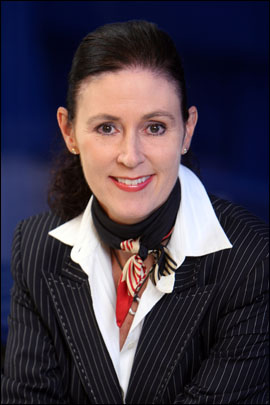Telstra's enterprise chief flies the coop

Telstra today revealed that the head of its Enterprise & Government division, Nerida Caesar, would leave the company, with her role to be filled by the telco's wholesale chief Paul Geason.

Nerida Caesar (Credit: Telstra)
After being promoted from the wholesale role, Caesar has been group managing director of Telstra's Enterprise & Government division since June 2009. Before that, the executive had held senior roles within the Enterprise & Government division, as well as IBM — the former home of Telstra chief executive David Thodey.
In a statement this morning, Thodey said Caesar would pursue another career opportunity and thanked the executive for leading one of Telstra's "largest and most important divisions" and achieving revenue growth while doing so.
After previously working in the Enterprise & Government division for three years, Geason took over Telstra Wholesale in June 2009. A long-time Telstra employee since 1994, Geason has also spent several years working in the US.
"I have worked closely with Paul for more than four years, both in the Enterprise & Government business unit and on the company's senior leadership team. I am confident that under Paul's leadership, our Enterprise & Government team will continue to offer innovative products and services and outstanding customer service," said Thodey.
Glenn Osborne, the executive director of Telstra Wholesale Sales, will lead the company's wholesale division in an acting capacity from tomorrow.
Telstra also said today that it expects to record an impairment charge against the carrying value of its Octave business in China of about $138 million.
Octave supplies mobile content and provides technical services to mobile platforms.
Telstra bought a 67 per cent stake in the Octave business in February 2009 for $259 million.
"Telstra first highlighted a potential impact on the Octave business in August 2010 following regulatory rulings that were expected to constrain the Wireless Application Protocol (WAP) market in China," Telstra said in a statement.
"The impact of the rulings has been clarified and consequently, Telstra has now updated the Octave business plan with the result it is expected to record an impairment charge against the carrying value of the Octave investments of approximately $138 million."
Telstra said the write-down did not affect guidance, which "explicitly excluded asset impairments and proceeds from asset sales".
The telco said its other businesses in China, such as Sequel and LMobile, "continue to perform well".